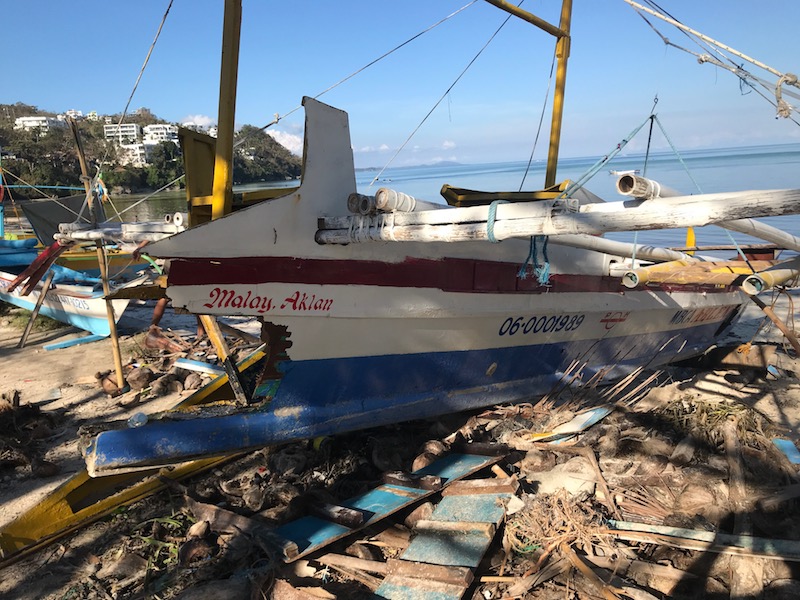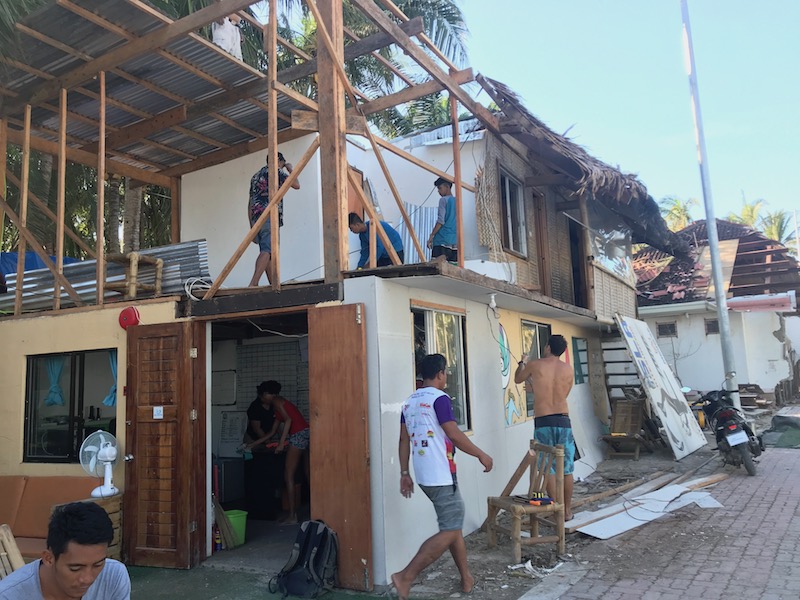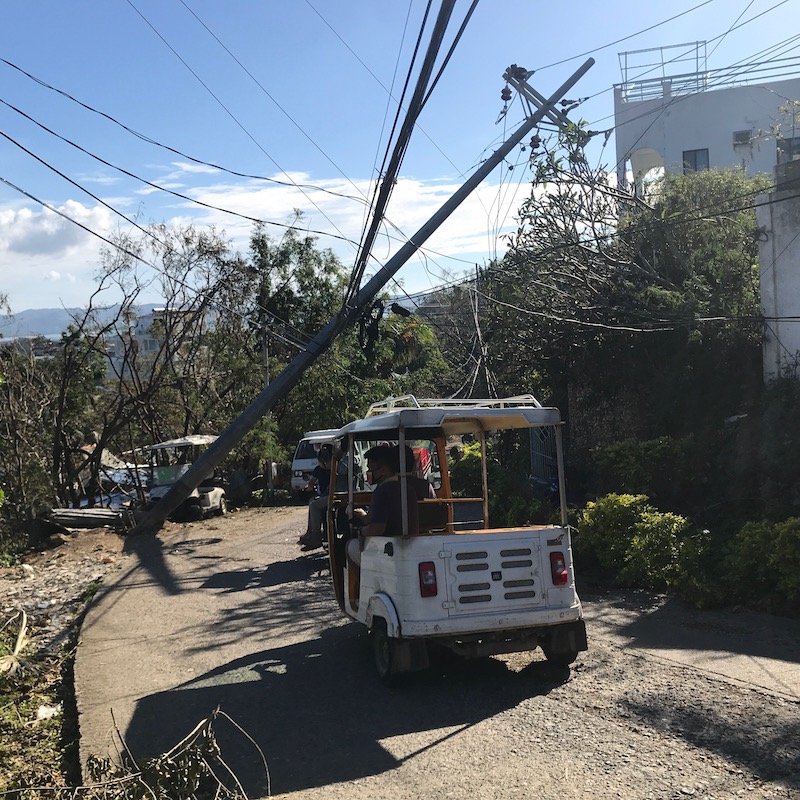Typhoon dramatizes our machine-learned helplessness

A collapsed building is seen on the Boracay Mount Luho Road in the wake of Typhoon Phanfone, on Boracay, Aklan, Philippines, on Dec 26, 2019. (Photo: Dave Kendall)
In psychology, “learned helplessness” is the result of repeated exposure to an aversive event, rendering a person unable to control their environment even when the tools are available.
The learned helplessness of technology, however, has taken away the tools.
On December 26, 2019, the day after what Filipinos call the Christmas Typhoon, the stretch of road from Boracay’s Bulabog beach up to Mount Luho looks like it’s been carpet-bombed. Many of the houses are piles of rubble or broken timber. Utility poles stand at crazy angles, cables dangling across the street. Fallen trees are everywhere – on the beach, across the road, on top of the remains of dwellings. Across the island, few buildings remain unharmed. Isla Kitesurfing no longer has a roof or a front.

Workers repair a building belonging to Isla Kitesurfing next to Bulabog Beach in the wake of Typhoon Phanfone, on Boracay, Aklan, Philippines, on Dec 26, 2019. (Photo: Dave Kendall)
A Filipino US army veteran is hunting in vain for a working ATM. He tells me he was disabled by an IED in Afghanistan, but that despite all he’s been through, this storm “was real scary.” Leya, a freelance massage therapist, says her children would have been killed if the tree had fallen on her rented house rather than the outhouse. The roof is gone anyway, and she and her kids are sleeping under the stars.
She’s not just traumatized, she’s scared. The door is broken, and if someone breaks in, she can’t switch on the light – the electrical grid is down. There’s no way to call the police – there’s no phone service. She can’t send a message to her mother because there’s no way to get online. She’s worried people will turn to crime: with all the ATMs offline, the tourists can’t get the cash the locals depend on. She has no customers herself, and she has little money for food.
My problems pale in comparison, but still I begin to feel helpless. I don’t know if my hotel still exists, and I can’t message or call them – I don’t even have the address because everything is online. It’s too dark to see how much cash I have left. I’m out of my comfort zone and worst-case-scenarios flicker through my mind. Fear of crime. Fear of starvation. I don’t know how to hunt, I don’t know how to grow food, I don’t know how to build shelter. I have no weapon and no combat training. I have no friends, no allies, no support network. I have become utterly dependent on technology, and nature has just pulled the plug.

A collapsed building is seen on the Boracay Mount Luho Road in the wake of Typhoon Phanfone, on Boracay, Aklan, Philippines, on Dec 26, 2019. (Photo: Dave Kendall)
“Critical information information infrastructure breakdown” is the eighth biggest risk in terms of impact according to the World Economic Forum’s 2019 ‘Global risks report’, ahead of man-made environmental disasters — and, poignantly enough amidst the coronavirus pandemic, the spread of infectious diseases. The relentless march towards greater technological sophistication and systems globalization is driven by economic and psychological forces, the desire for greater comfort, convenience, wealth, bragging rights, national security. But the Internet of Things means we are losing manual control over everything. Only electrical engineers and computer programmers can fix cars and planes. The Consumer Electronics Show in Las Vegas in January showcased the latest gadgets; you use your voice to turn a shower on, set the temperature you want and play the music of your choice from the showerhead speaker.
We are reliant on GPS technology and mapping software to tell us where we are, where we’re going and why we’re going there. We don’t carry maps — it’s not even easy to find one any more – and we’ve forgotten how to read one, if we ever knew. We’ve lost the ability to do basic arithmetic because we can always ask Alexa. When our cars become autonomous we’ll forget how to drive.
With all the answers instantly available at the touch of a screen, we lose the ability to research, to experiment, to ask questions, to figure things out for ourselves – we just watch the ‘how-to’ video on YouTube. Is artificial intelligence regressing our brains to the level of our hominid ancestors?

A broken power post is seen on the Boracay Mount Luho Road in the wake of Typhoon Phanfone, on Boracay, Aklan, Philippines, on Dec 26, 2019. (Photo: Dave Kendall)
As we become a cashless society, we are completely dependent on fintech. For now, we still carry a passport and a bank card, but their days are surely numbered. You can’t get on — or off — a Chinese train without passing a facial recognition scanner; the tech already exists to make all physical forms of identification obsolete. The connected machine can verify our fingerprints and scans our iris and face. It knows who we are, where we’ve been, how much money we have, everything we’ve bought, our behavioural patterns and our social credit rating.
And when the system goes down, we are nobody. No identity, no money, no assets. We live in the cloud. And the cloud can be blown away by a single glitch. The technological daisy chain has the fragility of a daisy.
Smart tech is making us dumb. In “The Terminal Self: Everyday Life in Hypermodern Times,” Simon Gottschalk writes: “The fewer skills we develop to accomplish everyday functions, the more we rely on the terminal. And the more we use the terminal, the less skilled we become. It’s a vicious cycle.”
In the aftermath of the vicious typhoon that buffeted Boracay, all the conspiracy theory-driven survivalists who hoard provisions and weapons and prepare for life off the grid suddenly seem a lot less crazy. I’ve learned how dependence on technology has made me helpless.